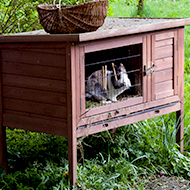
The petition calls for a legal minimum size for pet rabbits' houses.
A petition to ban the sale of inappropriately-sized rabbit hutches has amassed over 100,000 signatures.
Started by the Rabbit Welfare Association and Fund (RWAF), the petition states: “We want to ban the sale of inadequately sized hutches and introduce a legal minimum requirement for rabbit housing, giving rabbits the space they need to prevent painful, and often fatal, health issues from developing.
“We WANT A MINIMUM area of 10ft x 6 ft x 3ft / 3m x 2m x 1m at all times - and part of that should be a 6ft shelter.”
The RWAF is calling on the UK government to enshrine the first Good Practice Code for rabbit welfare in law, and to mandate a legal housing size for pet rabbits.
Rae Walters, RWAF director, said: “Whilst we are incredibly pleased that so many people have been moved to sign our petition, we still have much work to do.
“Until we see a change in the legislation with the adoption of the good practice codes for the welfare of pet rabbits, it remains the case that hundreds of thousands of pet rabbits in the UK are housed in dreadful conditions where they can’t express their natural behaviours.
“These poor creatures are often stuck in a tiny hutch for 24 hours a day where they can’t even stand up straight. They are forced to eat, sleep and toilet in the same cramped space which is both physically and emotionally crippling to pet rabbits, resulting in damaging effects on their health and wellbeing – and even premature death.
“Many people don’t realise that although there is a legal housing size requirement for meat and laboratory rabbits, there is currently no law for keeping pet rabbits.
“Until unsuitable accommodation is removed from sale, people will continue to wrongly believe that a small hutch in the garden will suffice."



 The Veterinary Medicines Directorate (VMD) is inviting applications from veterinary students to attend a one-week extramural studies (EMS) placement in July 2026.
The Veterinary Medicines Directorate (VMD) is inviting applications from veterinary students to attend a one-week extramural studies (EMS) placement in July 2026.